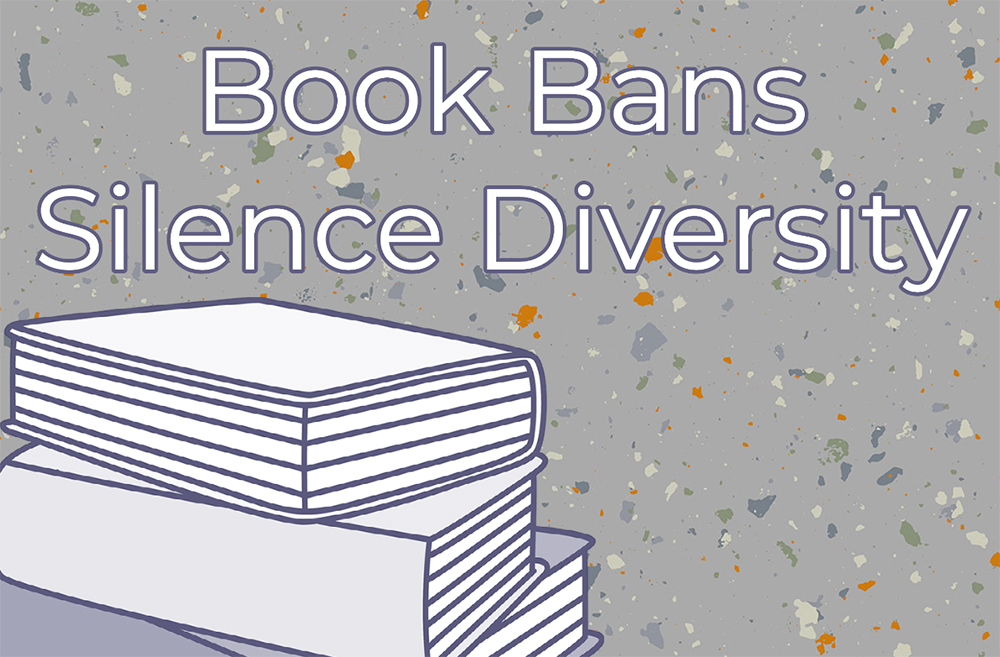It is Black History Month, and while this is a time when history is meant to be taught and remembered, there has been a recent effort to hinder the knowledge of certain events, people and movements. In the wake of the deaths of George Floyd, Breonna Taylor and many others, there has been an influx of content about the constant struggles of African Americans. Children’s books are being published that introduce children to ideology involving anti-racism, self-love and social equality.
While it feels like America is trying its hardest to move past this age of racism and inequality, there have been a select few who push back on these efforts. As a kid, the importance of reading was preached over and over again. As an adult, it’s heartbreaking that this fundamental activity is being attacked in educational spaces.
There are many books written by brilliant authors who share unique perspectives on the world around us. Many of these books carry stories that provoke a way of thinking that may be critical for youth when understanding the complexities of race, sex and gender. All of these big ideas play critical parts in everyday life, and it is important for all people to comprehend them. This understanding starts at a young age, and for that knowledge to be taken away by school boards and politicians will only cause detriment to the future of our country.
There is a long list of books that government officials deem too mature or indecent for the youth. These books will soon be taken off of school library shelves. When children reach a certain age, they are able to handle certain ideas but only when they learn enough at a younger age to connect the pieces.
African American history has always felt separate from American history. If and when we decide that the two are synonymous, these books won’t seem very terrifying. Among the books being banned are “The Hate U Give” by Angie Thomas, “The Handmaid’s Tale” by Margaret Atwood and “All Boys Aren’t Blue” by George M. Johnson.
“The Bluest Eye” is also among the many books that have been banned in Southern schools. It was written by Toni Morrison in 1970 and follows a young Black girl and her many troubles during the Great Depression. For any student to follow the premise, they must understand the dire economic circumstances that affected families all around the world during the Great Depression. They must also understand the situation African Americans were in during the 1940s. Segregation and discrimination were normal during this period of time, and the Civil Rights Movement was at its inception. While it is a fictional story, it carries many realistic circumstances aimed at making readers uncomfortable. People should feel uncomfortable with the darkest parts of our history and with the benevolent actions of antagonists. But just because something is unpleasant does not make it wrong. In fact, it should conjure up feelings of inspiration that force us to aspire to be better, more open minded and conscientious.
While some people view the banning of these books as a result of rotten content, I believe that it comes from a fear of letting in diverse voices. There is a fear of the breaking down and condemnation of traditional values. Among those values is the persistent effort to persuade the American people that United States history revolves around maintaining a heroic or patriotic narrative.
Context matters. It feels like politicians are actively targeting the resources that provide essential context. How are people supposed to understand the struggle of women, African Americans and LGBTQ+ people now if they are not taught the history?
Megan Murray Cusick, deputy director of state advocacy at the American Library Association, spoke to ABC news about the consequences of banning books.
“[These consequences include] … loss of engagement in school, self-efficacy in reading skills, in terms of engagement between caregivers and children on important issues, in terms of empathy and understanding of people who have very different backgrounds or experiences than we do,” Cusick said.
It is unpatriotic of our country to hinder the factual teachings of this country. How can a country value education when there are crucial ideas not being taught? We are now at a point where certain curriculums are being banned. College Board received heavy criticism for their recently released outline for their AP African American studies course. In order to appease the views of Ron DeSantis and other members of the GOP, College Board decided to strip away most topics.
“If anything, the arguments over the curriculum underscore the fact that the United States is a country that cannot agree on its own story, especially the complex history of Black Americans,” a New York Times article said.
History has always been written by the people with the most power, yet when African Americans have the ability to share their perspective, they are shut down. Their truths become controversial and then deemed too mature or too indecent to teach. This is not a controversy of what has happened, but a debate on whether we should share it. According to CBS, during the 2021-2023 school year, over 1,600 books were banned from schools. The Nation even reports that Florida teachers feel a need to hide their unapproved books out of fear of facing a five year jail sentence.
In a country where minorities only get a month to commemorate their history, it is important that throughout that period, we make an effort to understand each other. Education is the cornerstone to our society.
“If you can’t fly then run, if you can’t run then walk, if you can’t walk then crawl, but whatever you do you have to keep moving forward,” Martin Luther King Jr once said.
That is exactly what we must do for all things that matter, even if there are people who are willing to push back.




